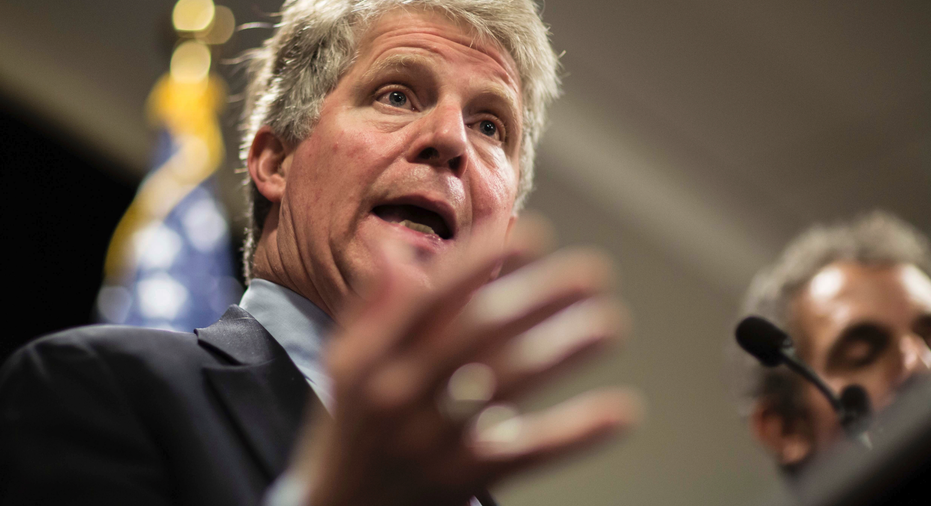DA who dropped Weinstein case rethinking campaign donations

NEW YORK – A furor over the Manhattan district attorney's decision to shut down a groping investigation of Harvey Weinstein two years ago is putting a spotlight on the DA's practice of taking campaign contributions from defense attorneys.
Cyrus R. Vance Jr. insists he doesn't let money influence his decisions, and his representatives say all donations are vetted for potential conflicts of interest, and some are refused. Moreover, accepting contributions from the defense bar is common among many prosecutors in New York state and beyond.
But the practice troubles many good-government watchdogs because of the doubts it can sow about the fairness of the criminal justice system, as the Weinstein case demonstrated.
Vance's campaign records show the two-term Democrat has taken money from lawyers who regularly face off against his staff in court, from white-shoe firms to scrappy criminal defense attorneys with less-notable clients.
Vance's donor list includes his former private-practice law partner, Elkan Abramowitz, who was hired by Weinstein in 2015 to successfully fend off an allegation that the Hollywood studio boss molested a 22-year-old Italian model during a business meeting. Abramowitz has contributed nearly $26,000 to Vance, most of it before he was hired by Weinstein, who has denied any non-consensual sexual contact with any women.
After a barrage of sexual harassment and assault allegations led to Weinstein's downfall earlier this month, the National Organization for Women held a protest outside Vance's office over his refusal to prosecute, and the disclosure about the campaign contributions only compounded the anger.
Vance said the prosecutors in his sex-crimes unit determined they couldn't prove the woman's allegations, even though police had recorded Weinstein apologizing after she accused him of grabbing her breast.
On Sunday, the DA announced that he has temporarily stopped accepting donations and asked an outside ethics group, the Center for the Advancement of Public Integrity, to review how his campaign handles contributions and potential conflicts.
"I've never allowed someone's wealth, power, race, or campaign contributions to influence my decisions," he wrote in the Daily News. "Over the past few days, I've learned that it's not enough for me to have confidence in my independence from donors. The people of New York deserve to be confident about it as well."
Susan Lerner, executive of the good government group Common Cause, said as long as private money funds elections for local prosecutors, there will be suspicions about the criminal justice system.
"The problem is systemic," she said. "It's not at all limited to DA Cy Vance."
Most of New York state's 62 district attorneys also accept campaign contributions from defense lawyers.
There are plenty of legitimate reasons a defense attorney might donate to a prosecutor. A civic-minded lawyer might want to help elect a district attorney who is interested in reducing the prison population, cracking down on police brutality or reducing prosecutions for marijuana possession. Lawyers are often among the top donors to political candidates of all stripes.
Vance has raised more than $6 million since he started running for Manhattan district attorney in 2008. He is now running unopposed for a third term.
A review by The Associated Press of the nearly 300 top donors found several instances of potential conflicts.
Between 2008 and April 2016, Vance accepted $23,688 from the Manhattan law firm Clayman and Rosenberg and its two founding partners during a period when the firm's attorneys represented defendants being prosecuted by the district attorney. During one prosecution, against an executive charged in a 2014 payday lending case,, the law firm and its partners gave $4,000 to Vance's campaign while the case was active, including $2,000 the month before their client pleaded guilty to a misdemeanor.
In a statement, the law firm denied it made contributions in the hopes of favorable treatment.
Vance's campaign has taken $4,600 from the law firm led by Benjamin Brafman, the defense lawyer who represented Dominique Strauss-Kahn in 2011 when the former head of the International Monetary Fund was charged with sexually assaulting a hotel housekeeper. All of those donations came after Vance decided to drop the case because of questions about the accuser's credibility.
The head of a private investigation firm that assisted in Strauss-Kahn's defense has also given $10,000 to Vance over the years.
Representatives for Vance's campaign and the district attorney's office say potentially problematic contributions are supposed to be flagged by a senior prosecutor who reviews every dollar donated, while a few volunteer lawyers for the campaign do the same.
Since 2008, that vetting led to the return of 19 donations, for a total of $128,498, with an additional 12 donations worth at least $6,000 refused outright, Vance's staff said.
Those refunds include an $18,291 donation that the campaign accepted in 2012 from Eugene Remm, owner of a nightclub that was scrutinized by the district attorney's office in 2010 when the teenage daughter of the U.S. ambassador to Thailand died in a 22-story fall from a Manhattan apartment building after a night of drinking. No charges were ever brought against the club or its employees.
Vance also recently returned a $32,000 campaign contribution from a lawyer who represented the Trump Organization in a fraud investigation that the district attorney ultimately decided to close in 2012 for lack of evidence. The lawyer, Marc Kasowitz, gave the money five months after Vance closed the case.
Kasowitz and Vance said the donation had nothing to do with the decision to close the investigation, but Vance returned the money after being questioned about it by journalists.



















